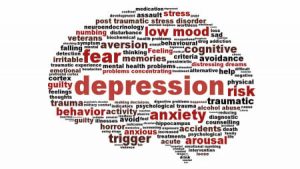Getting answers to questions such as what are the type of depression and how to overcome it can help you get on the road to recovery. Depending on your symptoms, there are a variety of treatments available. Some people benefit from Psychotherapy while others turn to prescription medications.
Symptoms
Symptoms of depression are very complex and vary from person to person. They include fatigue, sadness, loss of interest in activities, and sleep problems. Often, depression can be triggered by a medical condition.
There are two primary types of depression. The first is major depressive disorder. This type of depression is characterized by feelings of hopelessness, guilt, and worthlessness. This type of depression usually lasts for at least two weeks. It is often accompanied by physical symptoms such as fatigue, sleep problems, or weight loss.
The second type of depression is called reactive depression. This type of depression is caused by stressful life events. It is often accompanied by symptoms of irritability and pessimism.
Causes
Getting the right treatment for depression can improve your symptoms and give you the chance to get better. Treatment can take a few weeks or even longer. It is best to seek help early on to avoid worsening your symptoms.

Depression is a mental illness that causes intense feelings of sadness, hopelessness, and apathy. It can affect you physically and emotionally. Symptoms can include loss of appetite, fatigue, changes in sleep and weight.
The causes of depression are unknown. Researchers are investigating genes and environment as possible factors. A family history of depression is a risk factor. A history of bad childhood situations may also increase the risk.
Treatments
Getting the right treatments for depression can be frustrating. You’ll have to go through several stages to find a treatment that works for you. Your first step is to make an appointment with your GP. The GP may ask you to complete a screening questionnaire or may refer you to a psychologist or counselor.
Psychological therapies can help you understand the causes of depression, change your thinking patterns, and learn new coping skills. These therapies can be helpful in combination with medication.
Cognitive behavioral therapy (CBT) is one of the most common forms of therapy for depression. It teaches people how to change negative thought patterns and improve personal relationships.
Amphetamine
amphetamine has the potential to significantly improve depressive symptoms, especially during treatment-resistant depression. It may even be able to speed up the time it takes for depressive symptoms to improve.
The drug works on the N-methyl-D-aspartate (NMDA) receptor, an ionotropic glutamate receptor in the brain. The receptor facilitates communication between nerve cells, helping the brain to fight symptoms of depression. The drug also stimulates neurogenesis, or the formation of new brain connections.
Esketamine is typically given as a nasal spray treatment. Patients administer the medication themselves at their doctor’s office. The drug is approved by the Food and Drug Administration (FDA) for treatment-resistant depression in adults.
Psychotherapy
Whether you have been suffering from depression for years or you’re just now becoming aware of the problem, depression therapy can help you get on the path to recovery. The process helps you examine your emotions and identify the causes of your depression.
A qualified therapist can help you develop healthy habits and strategies for dealing with stress. This will not only improve your mental health, it will also improve your relationships and lead to a happier life.
Psychotherapy can help you develop new coping skills, which can reduce the symptoms of depression. It can also help you regain control of your life. It can also strengthen your relationships and improve your memory.
Perinatal and postpartum depression
Approximately one in eight women will experience symptoms of depression after giving birth. This is often referred to as postpartum depression or PPD. The symptoms may vary from mild to severe. It can affect a woman’s ability to care for herself and her baby.
Symptoms include sadness, loss of interest, anger, confusion, and irritability. It may also be accompanied by physical symptoms such as fatigue. It’s important to seek medical help for this condition.
Mostly people have no idea to overcome the depression but the research says that if you talk with girls or spend time with girls then your depression will released. Mostly people book the best escorts in Lahore and spend the whole night with them and offer that they fell relaxed.
It’s possible to overcome perinatal and postpartum depression. Often, medication and talk therapy are used. Antidepressants are a common treatment. However, many women opt to use alternative methods. Acupuncture, for example, has been shown to be effective in treating perinatal depression.



















Leave a Reply